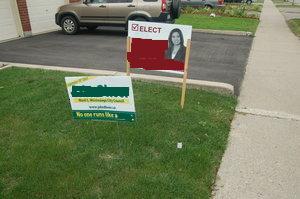Question of the month from the Garvie Reading Room:
Can my landlord prevent me from displaying an election sign supporting a particular candidate?
 This depends on the type of election. Both the Canada Elections Act (S.C. 2000, c. 9), section 322, and the Alberta Election Act (E.1, RSA 2000), section 135.5 state clearly that no landlord may prohibit a tenant from displaying election advertising posters on the premises nor may any condominium corporation prohibit any owner or tenant from displaying such posters. They do allow the landlord or condominium corporation to set reasonable limits on the size or type of posters and to prohibit such displays in common areas of the building. Common areas are usually those areas that all tenants can access, like the laundry room, parking lot and land surrounding the building.
This depends on the type of election. Both the Canada Elections Act (S.C. 2000, c. 9), section 322, and the Alberta Election Act (E.1, RSA 2000), section 135.5 state clearly that no landlord may prohibit a tenant from displaying election advertising posters on the premises nor may any condominium corporation prohibit any owner or tenant from displaying such posters. They do allow the landlord or condominium corporation to set reasonable limits on the size or type of posters and to prohibit such displays in common areas of the building. Common areas are usually those areas that all tenants can access, like the laundry room, parking lot and land surrounding the building.
However, the Alberta Local Authorities Election Act (E-21, RSA 2000), which governs municipal elections makes no reference to election advertising at all, other than to prohibit such displays at polling stations on election day. Many municipalities have bylaws or regulations related to campaign signs on municipal property and roadways. Generally they have no regulations about private property but do caution that placement of signs on private property must have the permission of the property owner. This would imply that in a municipal election the landlord can refuse for a tenant to display a campaign poster or ask a tenant to remove a sign that has been posted. There may even be a term in your lease governing such displays.
Because each province governs both their own elections and their municipalities, these rules may well differ in other provinces.
A Question about Pocket Bikes (mini-motorcycles)
Question of the month from the Garvie Reading Room:
What are the rules about riding a pocket bike in Canada? Can I ride it on the roadway or on sidewalks?

The governing of motor vehicles is a shared jurisdiction: provincial and territorial governments regulate and enforce the licensing, operation, modification and maintenance of all vehicles using public roads while Transport Canada controls the importing of vehicles and motor vehicle safety standards.
Because the rules about what types of vehicles are allowed on public roadways are set by provincial and territorial governments there is not one answer for the whole country. Following are three examples of the rules in three different provinces.
Information for BC comes from the Insurance Corporation of British Columbia who advise that “Mini motor vehicles, commonly referred to as “pocket bikes” or “mini choppers,” do not meet federal safety standards for use on public roads. Their use is limited on public roads to designated parade routes. The reason that these vehicles aren’t generally allowed on public roads is because they don’t meet minimum height specifications for headlamps, tail lamps, stop lamps, and turn signals. They’re also difficult for other motorists to see.”
On a webpage titled “New and Alternative Vehicles”, Ontario Transportation writes that: “Pocket bikes are meant for closed circuit use only, not public roadways. These bikes can be imported as “restricted-use motorcycles.” However, in order to comply with federal standards, pocket bikes require 17-digit vehicle identification numbers, reflectors and warning labels that clearly state these bikes are intended for off-road use only.”
Alberta Transportation has a Fact Sheet which explains that pocket bikes are prohibited motor vehicles meaning that they are not permitted on roadways which includes sidewalks along the roadway. They may only be operated on private property.
If your province is not covered in this article, you could contact your provincial or territorial government department of transportation for more information. A list of links is provided here (scroll down to the Provincial Governments section).
Can a landlord charge a tenant for renovations?
I just got a question from a tenant. The landlord replaced all the windows in the rental property, and then gave the tenant a bill for half the cost of the renovations. Seriously.
The tenant doesn’t have to pay the landlord the money. There are some costs that are simply the costs of doing business, and maintaining the property by replacing windows is just one of many costs this landlord is going to run into.\
If the tenant had broken a window because, I don’t know, there was an intense game of indoor baseball going on, then yes, for sure, the landlord could charge the tenant for the repair and replacement of the window. Or the landlord could charge the tenant when the tenant moved, and keep some of the security deposit to cover the cost.
The Residential Tenancies Act doesn’t actually set out who is responsible for repairs and that’s why sometimes, there is confusion about what repairs the landlord can charge the tenant for, and what repairs the landlord can’t charge for. The common sense approach is that any “big” repairs are the landlord’s responsibility and “teeny tiny” repairs are the tenant’s responsibility. So, while the tenant can change the lightbulb, it’s the landlord that installs the new light fixtures when the old ones break.
There is also the Minimum Housing and Health Standards that can help us to decide who should pay for repairs. One of the landlord’s responsibilities is to make sure that the rental property meets these standards. The standards set out that the windows must be in good repair, free of cracks and weatherproof. So, if the windows in the property do not meet this standard, then it’s the landlord’s job to make sure that the windows get repaired or replaced. If the property is not being maintained, then the tenant can call Environmental Public Health and talk to an inspector about the problem that they’re having with the rental.
What should the tenant do? The tenant should tell the landlord, in writing, that they are not going to pay for the windows. The tenant could put in reasons why they aren’t paying (and while it might be tempting to write that you aren’t paying because the charge is ridiculous, it’s probably better to refrain). Hopefully the landlord will just go away at this point. If the landlord still insists on being paid, then there are three ways the landlord may react.
- The landlord could sue the tenant for half of the cost of the renovation. The landlord is going to have to convince a judge that the tenant should have to pay for the windows, which seems unlikely.
- The landlord could keep the security deposit when the tenant moves out. If the tenant doesn’t agree with a charge made against the security deposit, then the tenant can bring an application in Provincial Court or through the Residential Tenancy Dispute Resolution Service for return of the security deposit.
- The landlord could pass the bill to a collection agency. If the tenant is contacted by a collection agency, then the tenant can inform the agency in writing that the tenant is disputing the debt, and ask that the landlord prove the debt in court. If the tenant does that, then the collection agency cannot contact the tenant any longer. Service Alberta has a tipsheet about dealing with collection agencies.
In the meantime, the tenant might want to think about moving. If the landlord thinks that the tenant should pay for the windows, what else does he think the tenant should pay for?
Illegal Activities in a Rental Property
 I went out of town and a friend was staying at my place to look after my dog. My landlord caught him smoking pot on the balcony, and now the landlord is trying to evict me. Can my landlord do that?
I went out of town and a friend was staying at my place to look after my dog. My landlord caught him smoking pot on the balcony, and now the landlord is trying to evict me. Can my landlord do that?
Probably not. Under the Residential Tenancies Act (RTA), if the tenant commits any illegal acts or carries on an illegal trade in the property, then the tenant has committed a substantial breach of the tenancy agreement, and can be evicted by the landlord. But, the issue in your case is that you were not the one who was committing an illegal act; your friend was.
Generally speaking, if you did not have knowledge of or control over the illegal acts, then your landlord cannot evict you for them. In the 2007 case Fairmont Hotels Inc. v. Zwir, from the Provincial Court of Alberta, the landlord tried to evict the tenant for a similar reason. The tenant’s cousin had come to stay with her, and while she was in another apartment, the cousin smoked a joint in her place and got caught by a security guard. The landlord tried to evict her for committing an illegal act, and the Judge wrote at paragraphs 16 and 17 that:
The illegal act here is a criminal act and under criminal law, in these circumstances where the tenant neither knew nor authorized the illegal activity, it is not likely the tenant did anything illegal.
Accordingly, I am not convinced that the tenant, Ms. Zwir, has breached Section 21 of the Act and accordingly I am not convinced that the illegal act here puts Ms. Zwir in substantial breach so as to justify summarily terminating her tenancy.
In your case, ignorance is bliss!
So what to do if your landlord serves you with a 14 day notice terminating your tenancy?
If you don’t want to leave, then you can serve your landlord with a notice of objection. The notice of objection should state the reasons why you do not agree with the termination notice. You must serve this notice on the landlord personally, or by registered or certified mail, before the termination day in the landlord’s notice. If you meet these requirements, then the landlord’s notice terminating your tenancy is ineffective and your tenancy stays in place. If your landlord still wants to evict you, then he has to make an application to terminate your tenancy.
Remember that if you are going to object to the notice, you need to follow the rules and serve the landlord properly and on time.
If your landlord does make an application to terminate your tenancy, then your landlord will serve you with more papers, and you will have a chance to respond to the application and tell your version of events.
And next time you’re out of town, you might want to give your dog a vacation at one of those fancy pet hotels instead.
Frequently Asked Questions:
- What if the landlord does not give the proper amount of notice?
- Can the tenant move before the notice takes effect?
- What if the landlord does not use the property for the reason stated in the notice?
- What happens if the tenant does not give the proper amount of notice?
- If the landlord has done something wrong, but it’s not a substantial breach, what can the tenant do?